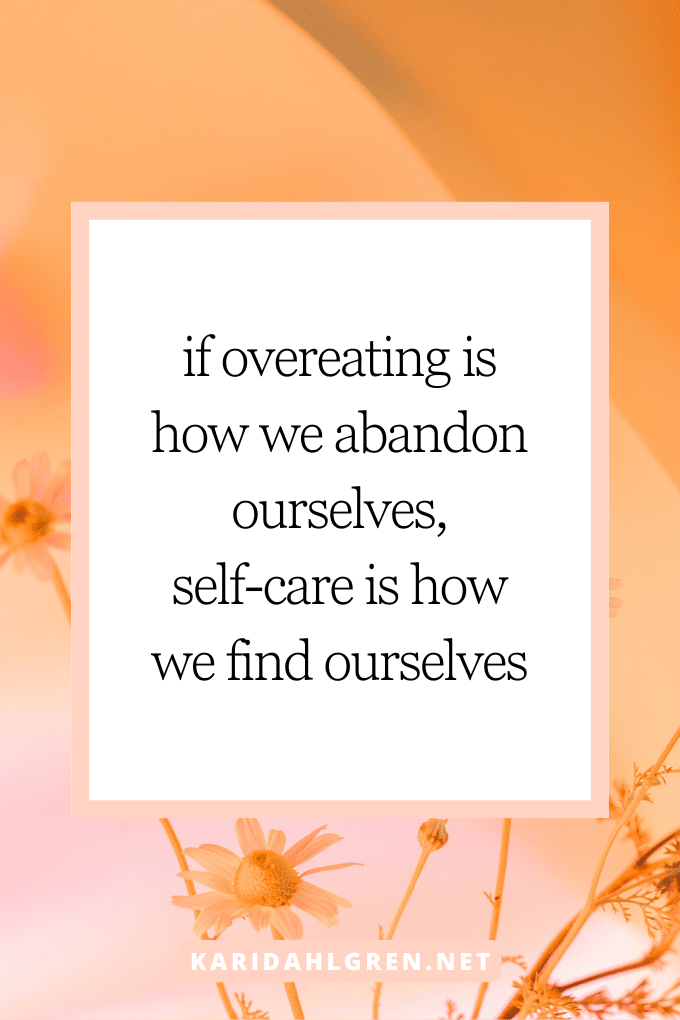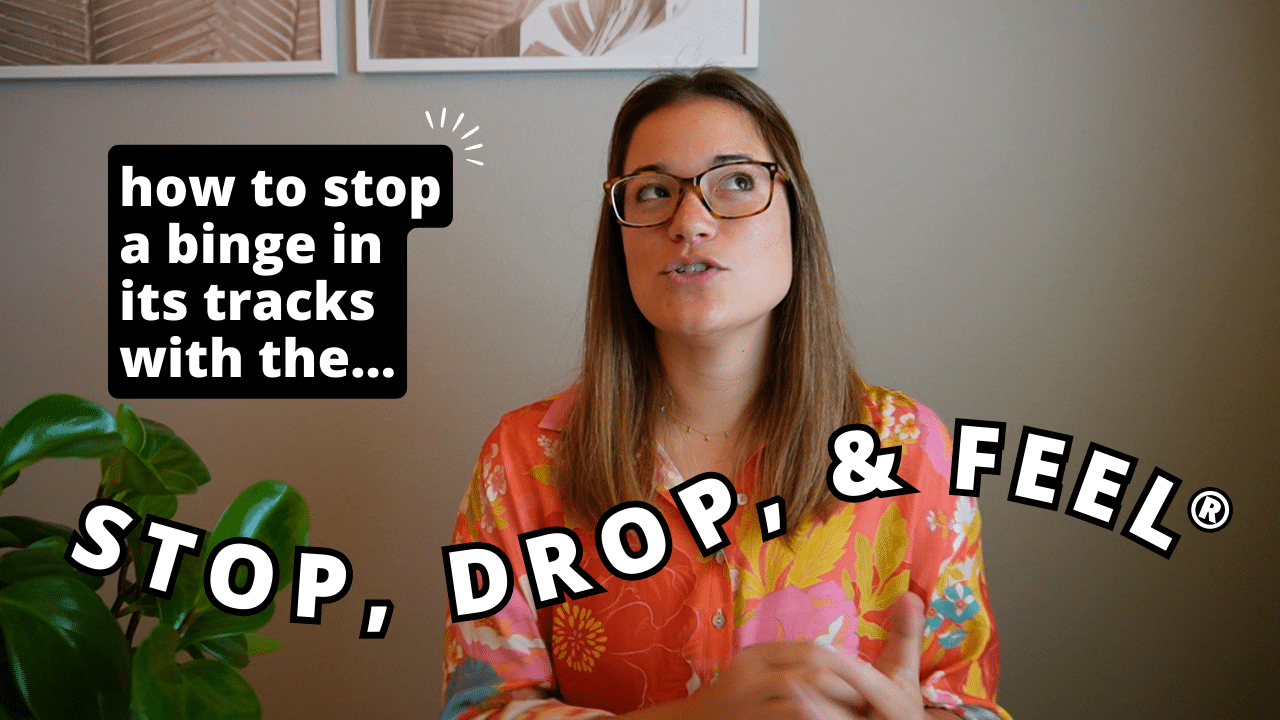
Overeating is often painted as a lack of willpower or control, but in reality, it runs much deeper. It’s a coping mechanism—a way we disconnect from ourselves when life feels too overwhelming, painful, or chaotic.
On the other hand, true self-care is how we reconnect, grounding ourselves in our bodies and emotions in ways that feel nourishing rather than numbing. It’s about tending to our deeper needs with compassion, even when it requires facing discomfort head-on.
In this article, we’ll explore the intricate link between overeating and abandoning one’s needs, how emotional resilience can help break this cycle, and how self-care—both the comforting and the challenging aspects—can guide us toward a healthier relationship with food and ourselves.
The Link Between Overeating and Emotional Detachment
Overeating often becomes a way to escape uncomfortable emotions like stress or sadness. Instead of facing our true needs—whether it’s emotional support or rest—we use food to numb ourselves. This creates a cycle where overeating leads to more disconnection. According to a review published in the Journal of Health Psychology, emotions like stress and depression frequently trigger overeating and poor food choices.[1]
It’s important to understand that overeating is nothing to be ashamed of. It’s a coping mechanism many of us use when we lack the tools to manage overwhelming emotions, and it can be a doorway into personal growth.
As noted in a study from Appetite, emotional eating in response to feelings like anxiety, boredom, and depression is closely tied to struggles with emotional regulation and well-being.[2] Rather than viewing overeating as a failure, we can use these moments as opportunities to explore the emotions we’re avoiding and learn healthier ways of coping without food.
Overeating amplifies distress over time, but it also provides insight into areas where we need more care and attention. A review in the Proceedings of the Nutrition Society highlights how emotional overeating can evolve into patterns like binge eating, but recognizing these behaviors can be the first step toward healing and reconnecting with ourselves.[3]
Why We Turn to Food as Comfort
Food often becomes a quick source of comfort in times of stress or emotional distress. When we’re overwhelmed, food offers immediate relief—its taste, texture, and association with pleasure can temporarily distract us from discomfort.
According to a review published in Neurogastroenterology & Motility, hyperpalatable foods—those high in fat, salt, and sugar—have a strong reward value thanks to the sensory experience and the brain’s emotional circuits, making them feel especially comforting.[4] This is what causes hedonic eating, a specific type of compulsive eating that’s driven by the pursuit of pleasure.
However, while comfort eating may offer momentary pleasure, the deeper emotional issues remain unresolved, often leaving us feeling worse afterward. Chronic stress can reinforce this cycle.
A study in Physiology & Behavior found that people exposed to chronic stress showed exaggerated brain activity in response to high-calorie food cues, making them more likely to overeat as a coping mechanism.[5] This neural reaction to comfort foods can become a habitual pattern, leading to overeating that goes beyond physical hunger, driven more by emotional needs than true nourishment.
Overeating as a Symptom of Deeper Needs
In my practice as an eating psychology coach, I believe that overeating is rarely just about food. It’s often a response to deeper emotional needs—loneliness, stress, or a desire for comfort. Sometimes there’s even an underlying spiritual root that we may not consciously see or feel, yet it quietly influences our decisions beneath the surface.
In the moment, reaching for food seems like the quickest way to feel better, but it’s a temporary fix that often leaves us feeling more disconnected from ourselves.
When we overeat, we’re not addressing what we truly need emotionally or psychologically; instead, we’re using food as a buffer. This creates a pattern of self-abandonment—instead of staying with ourselves and tending to our needs, we fling ourselves into compulsion.
If self-abandonment is how we buffer unwanted emotions with food, then coming back home to ourselves is about embracing those emotions with kindness and curiosity.
Self-care isn’t just about indulging in things that make us feel good in the moment like bubble baths and massages. Self-care is about nourishing ourselves in ways that bring long-term emotional well-being, too—and it doesn’t always feel the way we think it will feel.
Feeling Your Feelings: More Than Just Self-Care
Overeating often happens because we lack the tools to sit with our discomfort. Emotional tolerance—the ability to stay present with difficult feelings without running from them—can change this pattern.
When we learn to hold space for our emotions, even the uncomfortable ones, we no longer need to rely on overeating as a coping mechanism. Instead, we build resilience and grow stronger in our ability to face emotional challenges head-on.
My Stop, Drop, & Feel® technique offers a way to build emotional tolerance on the path to stopping compulsive eating:

The Stop, Drop, & Feel asks you to pause in the moment that you want to eat without hunger to drop into your feelings. Get curious about what might be floating around beneath the surface and try not to resist any uncomfortable emotions that break the surface. When you practice holding space for discomfort like this, you develop emotional tolerance. A study published in Eating Behaviors found that people with greater emotional tolerance experience less compulsive eating.[6]
Of course, this is a tall ask. As I’ve experienced personally, allowing yourself to fully feel your emotions—without reaching for food as a distraction—can knock you off your feet sometimes. It’s not easy, but it’s a powerful spiritual practice that helps you grow more connected to yourself and builds the resilience needed to break free from the cycle of compulsive eating.
Rebuilding the Relationship with Food and Self
Healing the cycle of overeating and self-abandonment is ultimately about rebuilding trust with yourself. When you begin to address your emotional needs through powerful forms of self-care like the Stop, Drop, & Feel, food shifts from being a crutch to becoming a source of genuine nourishment.
Sitting with discomfort, as hard as it is, teaches you that you don’t need food to avoid difficult emotions. It shows you just how strong you really are, and it reinforces a positive cycle of staying with yourself when life gets tough.




WOW what an incredible article! So happy I stumbled upon you Kari ???? this is EXACTLY the information I have been looking for. Thank you! X
Thank you so much for the wonderful comment Anna! Stoked to have you here! 😀
Your website was really helpful to me, I’ve been struggling for 6 months to understand what is happening to me and why I didn’t seem to care or accept that I was eating massive amounts of junk food, the normal amount of a family of 4 ! I’ve gained 16kg in 6 months and I don’t recognise myself. I was so happy to read your advice and different hypothesis on the subject, that to me really hits home.
Im feeling better already I had the courage to weigh myself and actually look at myself in the mirror for the first time as I’ve been avoiding it. this helped me understand how extreme the situation was. I’ve only ever had to loose 6-8 kg at one time. now I’m 16kg overweight and summer starts in like 2 weeks .I’m about to read your book that I downloaded for free. thank you , thank you
Hi cupcake! You are so brave! I love that you are willing to look within for the answer instead of turning to a diet. You are amazing and I am so glad you’re here!!! I’d love to know what you think of the book. Send me an email sometime 🙂 xo
I am not good on computer .. do you have a good old fashioned paper back version of why we do the things we do that can be sent to me? Stop, drop & feel is a good line! I will chuckle every time I am doing a mock fire drill at work ..
Hi Diane! I’m glad you like my cheeky Stop, Drop, & Feel! I do not have paperback versions of my books (yet) but I do include a 20-page printer-friendly version with my workbook so that you have something tangible to write on.
Hello- I have never answered a blog before, however I feel strongly that I relate to your subject and words of wisdom. I have been working with my ‘Food Angel’ and I am going to send her your information as you both are psychologically connected to the brain/food relationship. Thank you for helping me heal my deep food wounds.
Hi Sam! I am so glad this resonated with you so deeply. It really means a lot to me. I wish you the very best on this journey of health and healing!!